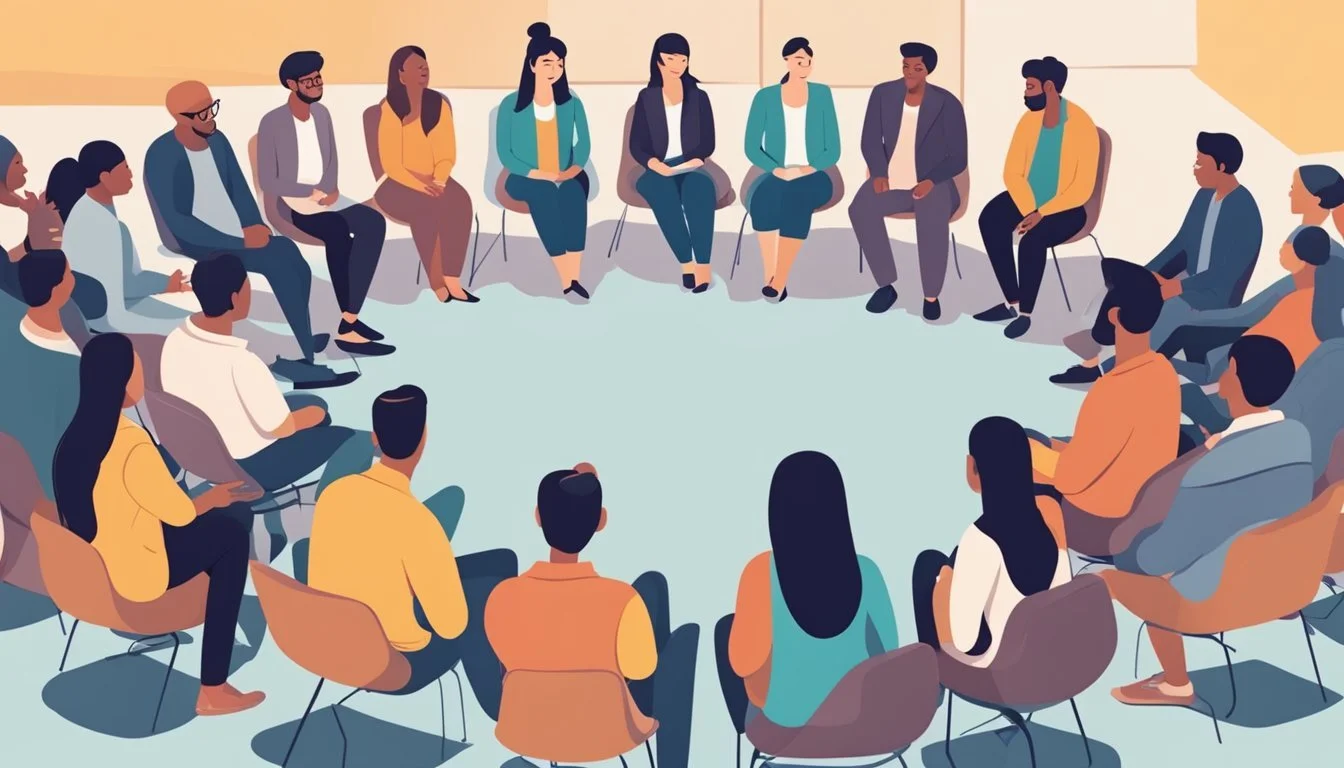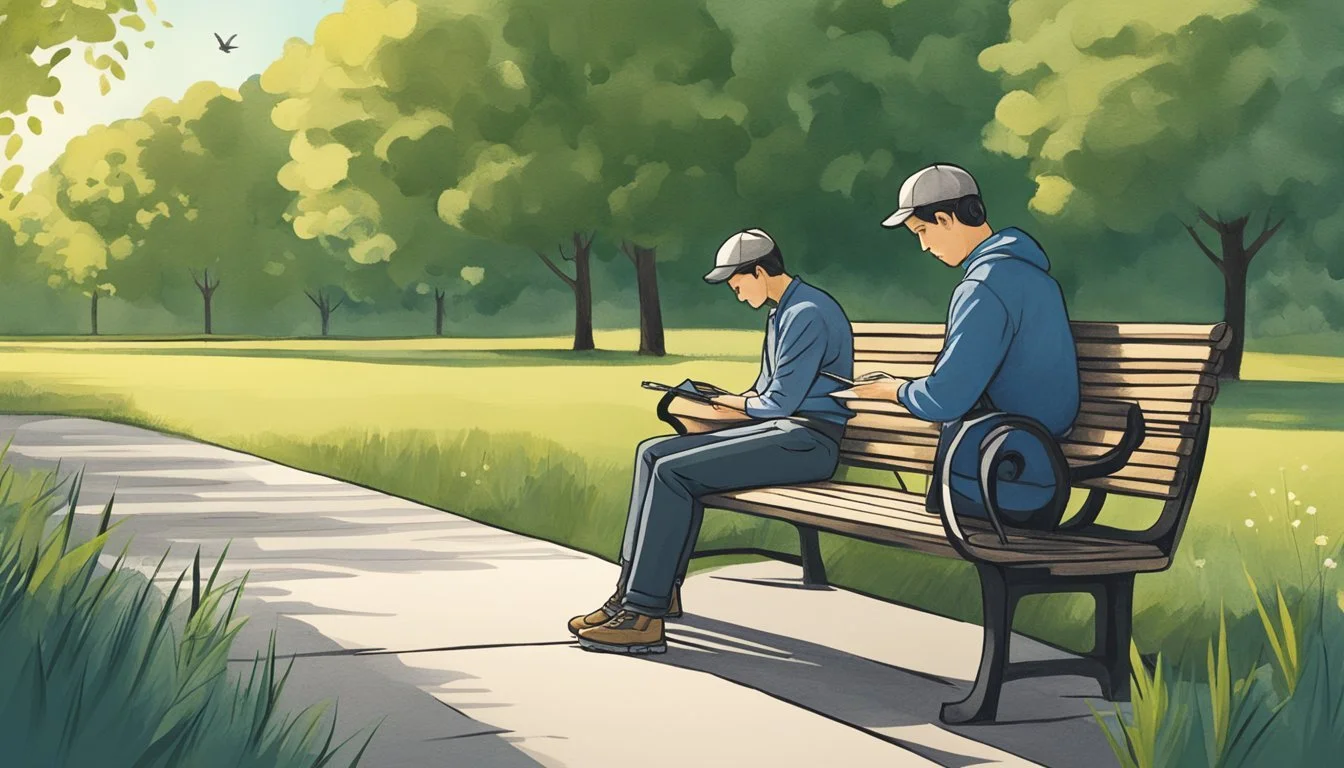11 Strategies for Dealing with BPD-Related Guilt
Effective Coping Techniques for Emotional Relief
Borderline Personality Disorder (BPD) can be a challenging condition to navigate, often accompanied by intense emotions and complex interpersonal relationships. One of the most difficult aspects for many individuals with BPD is dealing with guilt, which can be overwhelming and persistent.
Effective strategies exist to help manage BPD-related guilt and improve overall quality of life. By implementing these techniques, people with BPD can learn to process their emotions in healthier ways, develop self-compassion, and reduce the impact of guilt on their daily functioning. This article explores 11 practical approaches that can be beneficial for those struggling with guilt associated with BPD.
1) Self-Compassion Meditation
Self-compassion meditation is a valuable technique for individuals with Borderline Personality Disorder (BPD) to address feelings of guilt. This practice involves cultivating kindness and understanding towards oneself, especially during difficult moments.
To begin, find a quiet space and sit comfortably. Take a few deep breaths to center yourself. Focus on the present moment, acknowledging any feelings of guilt without judgment.
Gently place a hand over your heart, offering yourself comfort. Repeat phrases such as "I am worthy of love and respect" or "I handle my emotions with strength and grace" silently to yourself.
As thoughts arise, notice them without getting caught up in their content. Return your focus to your breath and the compassionate phrases. Practice this meditation for 5-10 minutes daily.
Regular self-compassion meditation can help reduce the intensity of guilt associated with BPD. It fosters a more balanced perspective on one's experiences and promotes emotional healing.
2) Journaling Your Emotions
Journaling is a powerful tool for individuals with Borderline Personality Disorder (BPD) to manage guilt-related emotions. This practice provides a safe space for self-reflection and emotional exploration, allowing people to gain insight into their thoughts and feelings.
By writing down their experiences, individuals can track patterns in their emotional responses and identify triggers for guilt. This awareness can help them develop healthier coping mechanisms and challenge negative thought patterns.
Journaling also offers an opportunity to explore and validate emotions without judgment. People with BPD can use prompts to guide their writing, focusing on specific situations that evoke guilt and examining their reactions.
Regular journaling can contribute to improved emotional regulation. By expressing feelings on paper, individuals may find it easier to process and release guilt, rather than letting it build up internally.
The act of writing can also serve as a form of self-compassion. It allows individuals to view their experiences from a more objective perspective, potentially reducing the intensity of guilt-related emotions.
3) Forgiving Yourself Practice
Self-forgiveness is a crucial skill for individuals with Borderline Personality Disorder (BPD) to develop. It involves acknowledging mistakes without harsh self-judgment and moving forward with compassion.
One effective technique is to write a letter of forgiveness to oneself. This process allows for reflection on past actions and the opportunity to express understanding and kindness.
Practicing positive self-talk can also aid in self-forgiveness. Replacing critical inner dialogue with supportive statements helps foster a more compassionate mindset.
Mindfulness exercises can be beneficial in cultivating self-forgiveness. These practices encourage being present in the moment and observing thoughts without judgment.
Setting realistic expectations is another important aspect of self-forgiveness. Recognizing that everyone makes mistakes can help reduce feelings of guilt and shame.
Seeking support from a therapist or trusted friend can provide guidance in the self-forgiveness journey. External perspectives often offer valuable insights and encouragement.
4) Cognitive Behavioral Therapy
Cognitive Behavioral Therapy (CBT) is a widely used approach for treating Borderline Personality Disorder (BPD) and addressing related guilt. This therapy helps individuals identify and challenge negative thought patterns that contribute to feelings of guilt.
In CBT sessions, therapists work with patients to recognize distorted thinking and replace it with more balanced, realistic perspectives. Patients learn to examine the evidence for and against their guilt-inducing thoughts.
CBT also teaches practical coping strategies to manage intense emotions associated with BPD-related guilt. These may include relaxation techniques, mindfulness exercises, and problem-solving skills.
The therapy often involves homework assignments, allowing patients to practice new skills between sessions. This reinforces learning and helps integrate healthier thought patterns into daily life.
CBT can be particularly effective in addressing the tendency of individuals with BPD to engage in black-and-white thinking, which often fuels excessive guilt. By promoting a more nuanced view of situations, CBT helps reduce the intensity of guilt experiences.
5) Mindfulness Techniques
Mindfulness techniques can be powerful tools for managing BPD-related guilt. These practices help individuals focus on the present moment, reducing rumination on past actions or future worries.
One effective technique is mindful breathing. By concentrating on each inhale and exhale, people with BPD can anchor themselves in the present, reducing guilt-driven thoughts.
Body scan meditation is another useful approach. This involves mentally scanning the body from head to toe, noticing physical sensations without judgment. It can help shift focus away from guilty feelings.
Mindful observation of thoughts can also be beneficial. This involves acknowledging guilt-related thoughts as they arise, but not engaging with them. Instead, individuals can visualize these thoughts passing by like clouds in the sky.
Practicing mindful self-compassion can counteract harsh self-judgment often associated with BPD-related guilt. This involves treating oneself with kindness and understanding, as one would treat a friend experiencing similar feelings.
Regular practice of these mindfulness techniques can help individuals with BPD develop a more balanced perspective on their experiences and emotions, reducing the intensity and frequency of guilt.
6) Support from a Therapist
Professional therapy is a valuable resource for individuals dealing with BPD-related guilt. A therapist specializing in Borderline Personality Disorder can provide targeted support and evidence-based treatments.
Dialectical Behavior Therapy (DBT) has shown particular effectiveness for BPD. This approach focuses on developing skills in mindfulness, distress tolerance, and emotion regulation.
Therapists can help clients identify the root causes of their guilt and develop healthy coping mechanisms. They provide a safe space for exploring complex emotions and learning to challenge negative thought patterns.
Cognitive Behavioral Therapy (CBT) is another beneficial approach. It helps individuals recognize and modify dysfunctional beliefs and behaviors associated with guilt.
Regular therapy sessions offer consistent support and guidance. Therapists can teach specific techniques for managing guilt-inducing situations and provide ongoing validation and encouragement.
Through therapy, individuals with BPD can gain new perspectives on their experiences and develop a more balanced self-view. This process can lead to reduced feelings of guilt and improved emotional well-being over time.
7) Connecting with Support Groups
Support groups offer a valuable resource for individuals dealing with BPD-related guilt. These groups provide a safe space to share experiences and connect with others who understand the challenges of living with borderline personality disorder.
Many support groups are led by people with firsthand experience of BPD, ensuring a focus on empowerment and practical coping strategies. Participants often find comfort in learning they are not alone in their struggles and can gain insights from others' journeys.
Support groups can help individuals develop new perspectives on their guilt and learn healthy ways to manage it. Members may share techniques that have worked for them, providing a toolkit of strategies for others to try.
Regular attendance at support groups can foster a sense of community and belonging, which can be especially beneficial for those who feel isolated due to their BPD symptoms. The supportive environment encourages openness and honesty about difficult emotions.
Online support groups are also available, offering accessibility to those who may have difficulty attending in-person meetings. These virtual communities can provide support and connection at any time, day or night.
8) Art Therapy Sessions
Art therapy offers a unique approach for individuals with Borderline Personality Disorder (BPD) to address guilt-related emotions. This creative outlet allows patients to express complex feelings that may be difficult to verbalize.
During sessions, clients engage in various artistic activities such as painting, drawing, or sculpting. These exercises provide a safe space for exploring and processing emotions associated with guilt.
Art therapists guide participants through the creative process, helping them interpret their artwork and gain insights into their emotional experiences. This can lead to improved self-awareness and emotional regulation.
The non-verbal nature of art therapy can be particularly beneficial for those who struggle to articulate their feelings. It allows for a more intuitive and less confrontational way of addressing guilt and other challenging emotions.
Through art therapy, individuals with BPD can develop healthier coping mechanisms and learn to manage guilt more effectively. The creative process can also boost self-esteem and provide a sense of accomplishment.
Regular participation in art therapy sessions can contribute to long-term emotional healing and personal growth for those dealing with BPD-related guilt.
9) Practicing Gratitude
Gratitude can be a powerful tool for individuals with Borderline Personality Disorder (BPD) to combat guilt. By focusing on positive aspects of life, people with BPD can shift their attention away from negative emotions and self-blame.
Keeping a gratitude journal is an effective way to cultivate this practice. Each day, individuals can write down three things they appreciate, no matter how small. This habit helps retrain the brain to notice and value positive experiences.
Another approach is expressing thankfulness to others. Verbalizing appreciation for kind gestures or support can strengthen relationships and boost self-esteem. This practice also helps counter the tendency to view interactions negatively.
Mindfulness exercises centered on gratitude can be beneficial. Taking a few minutes each day to reflect on blessings can help ground individuals in the present moment and reduce rumination on past mistakes.
Participating in volunteer work or helping others can also foster gratitude. These activities provide perspective and a sense of purpose, which can alleviate feelings of guilt and worthlessness often associated with BPD.
10) Realistic Expectations
Setting realistic expectations is crucial for managing BPD-related guilt. Individuals with BPD often hold themselves to impossibly high standards, leading to frequent feelings of failure and guilt.
Learning to set achievable goals and recognizing personal limitations can help reduce these negative emotions. It's important to understand that perfection is not attainable, and mistakes are a normal part of life.
Developing a more balanced view of oneself and others can also alleviate guilt. This involves acknowledging both strengths and weaknesses without harsh judgment.
Practicing self-compassion is key in this process. Treating oneself with the same kindness and understanding extended to loved ones can help counteract guilt-inducing thoughts.
Seeking support from therapists or support groups can provide guidance in setting realistic expectations. These resources can offer perspective and tools for managing guilt in a healthy way.
Remember that change takes time. Patience and persistence are essential when working on adjusting expectations and reducing BPD-related guilt.
11) Setting Healthy Boundaries
Setting healthy boundaries is crucial for managing BPD-related guilt. Individuals with BPD often struggle to differentiate their emotions from others, leading to excessive guilt and emotional turmoil.
Establishing clear limits helps protect one's emotional well-being and prevents burnout. It involves communicating personal needs and expectations clearly to others.
Boundaries can be physical, emotional, or mental. They may include limiting contact with triggering individuals or situations, expressing discomfort with certain topics, or setting time limits for interactions.
Consistency is key when implementing boundaries. Adhering to set limits, even when challenging, reinforces their importance and effectiveness.
It's important to remember that setting boundaries is not selfish. It's a form of self-care that allows individuals with BPD to manage their symptoms and maintain healthier relationships.
Learning to say "no" without guilt is an essential aspect of boundary-setting. This skill helps prevent overcommitment and reduces feelings of resentment or overwhelm.
Seeking support from a therapist or support group can provide guidance in developing and maintaining healthy boundaries. These professionals can offer strategies tailored to individual needs and circumstances.
Understanding BPD-Related Guilt
Guilt is a complex emotion often experienced intensely by individuals with Borderline Personality Disorder (BPD). It can stem from various sources and significantly impact daily life and relationships.
Identifying the Origin of Guilt
BPD-related guilt often originates from a deep-seated fear of abandonment or perceived wrongdoings. Individuals may feel guilty for expressing needs, setting boundaries, or experiencing intense emotions.
Past traumatic experiences or invalidating environments can contribute to the development of chronic guilt. This may lead to self-blame for situations beyond one's control.
Perfectionism and high standards commonly associated with BPD can exacerbate feelings of guilt. People may constantly feel they're not meeting expectations, leading to persistent self-criticism.
Differentiating Guilt from Shame
While guilt and shame are related, they differ in focus. Guilt centers on specific actions or behaviors, while shame involves negative feelings about oneself as a person.
In BPD, guilt often manifests as remorse for perceived mistakes or hurting others. Shame, however, may present as a pervasive sense of worthlessness or inadequacy.
Recognizing this distinction is crucial for effective emotional management. Guilt can motivate positive change, while shame tends to be more destructive and self-perpetuating.
Therapy techniques like Cognitive Behavioral Therapy (CBT) can help individuals separate valid guilt from excessive or irrational guilt responses. This process aids in developing healthier emotional patterns.
The Psychological Impact of Guilt in BPD
Guilt profoundly affects individuals with Borderline Personality Disorder (BPD), influencing their thoughts, emotions, and behaviors. It often leads to self-destructive patterns and strained relationships.
Effects on Mental Health
Guilt in BPD can trigger intense emotional distress and self-loathing. Individuals may experience frequent mood swings, anxiety, and depression. This persistent guilt often reinforces negative self-perceptions, leading to a cycle of self-criticism and low self-esteem.
Chronic guilt can also exacerbate BPD symptoms, making emotional regulation more challenging. People with BPD may engage in self-harm or suicidal ideation as misguided attempts to cope with overwhelming guilt.
The constant burden of guilt can impair cognitive functioning, affecting concentration and decision-making abilities. This may result in difficulties at work or in personal relationships.
Long-Term Behavioral Patterns
Guilt-driven behaviors in BPD often manifest as people-pleasing tendencies. Individuals may constantly seek approval from others to alleviate their guilt, often at the expense of their own needs and boundaries.
Avoidance behaviors are common, as people with BPD may withdraw from social situations or responsibilities due to guilt-induced fear of rejection or failure. This can lead to isolation and further reinforce negative self-perceptions.
Guilt can drive compulsive behaviors such as excessive apologizing or attempts to "make up" for perceived wrongdoings. These actions may temporarily ease guilt but rarely address underlying issues.
In some cases, guilt in BPD can lead to self-sabotaging behaviors. Individuals may unconsciously create situations that confirm their negative self-image, perpetuating a cycle of guilt and low self-worth.






